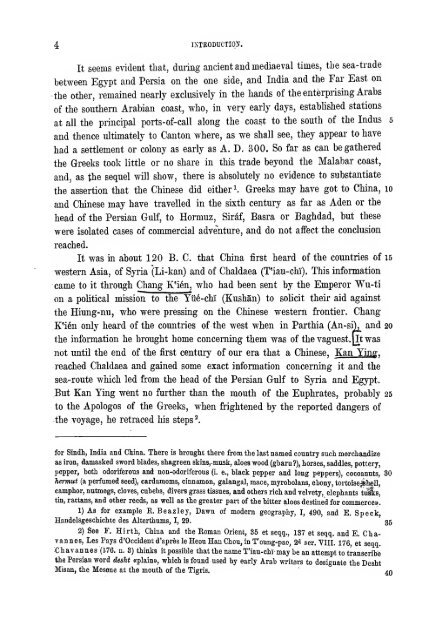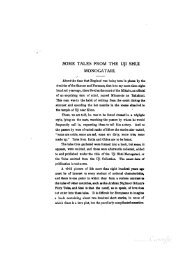Chau Ju-Kua - University of Oregon Libraries
Chau Ju-Kua - University of Oregon Libraries
Chau Ju-Kua - University of Oregon Libraries
Create successful ePaper yourself
Turn your PDF publications into a flip-book with our unique Google optimized e-Paper software.
4<br />
KTRODTJCTIOS.<br />
It seems evident tliat, during ancient and mediaeval times, the sea-trade<br />
between Egypt and Persia on the one side, and India and the Far East on<br />
-the other, remained nearly exclusively in the hands <strong>of</strong> the enterprising Arabs<br />
<strong>of</strong> the southern Arabian coast, who, in very early days, estabhshed stations<br />
at all the principal ports-<strong>of</strong>-call along the coast to the south <strong>of</strong> the Indus 5<br />
and thence ultimately to Canton where, as we shall see, they appear to have<br />
had a settlement or colony as early as A. D. 300. So far as can be gathered<br />
the Greeks took little or no share in this trade beyond the Malabar coast,<br />
and, as the sequel will show, there is absolutely no evidence to substantiate<br />
the assertion that the Chinese did either ^ Greeks may have got to China, lo<br />
and Chinese may have travelled in the sixth century as far as Aden or the<br />
head <strong>of</strong> the Persian Gulf, to Hormuz, Siraf, Basra or Baghdad, but these<br />
were isolated cases <strong>of</strong> commercial adventure, and do not affect the conclusion<br />
reached.<br />
It was in about 120 B. C. that China first heard <strong>of</strong> the countries <strong>of</strong> 15<br />
western Asia, <strong>of</strong> Syria (Li-kan) and <strong>of</strong> Chaldaea (T'iau-chi). This information<br />
came to it through Chang K'ien, who had been sent by the Emperor Wu-ti<br />
on a political mission to the Yu6-chi (Kushan) to solicit their aid against<br />
the Hiung-nu, who were pressing on the Chinese western frontier. Chang<br />
K'i6n only heard <strong>of</strong> the countries <strong>of</strong> the west when in Parthia (An-si)^ and 20<br />
the information he brought home concerning them was <strong>of</strong> thevagiiest.[ltw^as<br />
not until the end <strong>of</strong> the first century <strong>of</strong> our era that a Chinese, Kan Ying .<br />
reached Chaldaea and gained some exact information concerning it and the<br />
sea-route which led from the head <strong>of</strong> the Persian Gulf to Syria and Egypt.<br />
But Kan Ying went no further than the mouth <strong>of</strong> the Euphrates, probably 25<br />
to the Apologos <strong>of</strong> the Greeks, when frightened by the reported dangers <strong>of</strong><br />
-the voyage, he retraced his steps ^.<br />
for Sindh, India and China. There is brought there from the last named country such merchandize<br />
as iron, damasked sword blades, shagreen skins,-musj£, aloes wood (gbaru?), horses, saddles, pottery,<br />
pepper, both odoriferous and non-odoriferous (i. e., black pepper and long peppers), cocoanuts, 30<br />
hermut (a perfumed seed), cardamoms, cinnamon, galangal, mace, myrobolans, ebony, tortoise^hell,<br />
camphor, nutmegs, cloves, cubebs, divers grass tissues, and others rich and velvety, elephants tu^s,<br />
tin, rattans, and other reeds, as well as the greater part <strong>of</strong> the bitter aloes destined for commerce)).<br />
1) As for example K. Beazley, Dawn <strong>of</strong> modern geography, I, 490, and E. Speck,<br />
Handelsgeschichte des Alterthums, I, 29. 35<br />
2) See F. Hirth, China and the Roman Orient, 35 et seqq., 137 et seqq. and E. Chavannes,<br />
Les Pays d'Occident d'apres le Heou Han Chou, in T'oung-pao, 2* ser. VIII. 176, et seqq.<br />
Chavannes (1-76. n. 3) thinks it possible that the name T'iau-chi- may be an attempt to transcribe<br />
the Persian word desht «plainD, which is found used by early Arab writers to designate the Desht<br />
Misan, the Mesene at the mouth <strong>of</strong> the Tigris.<br />
4q

















